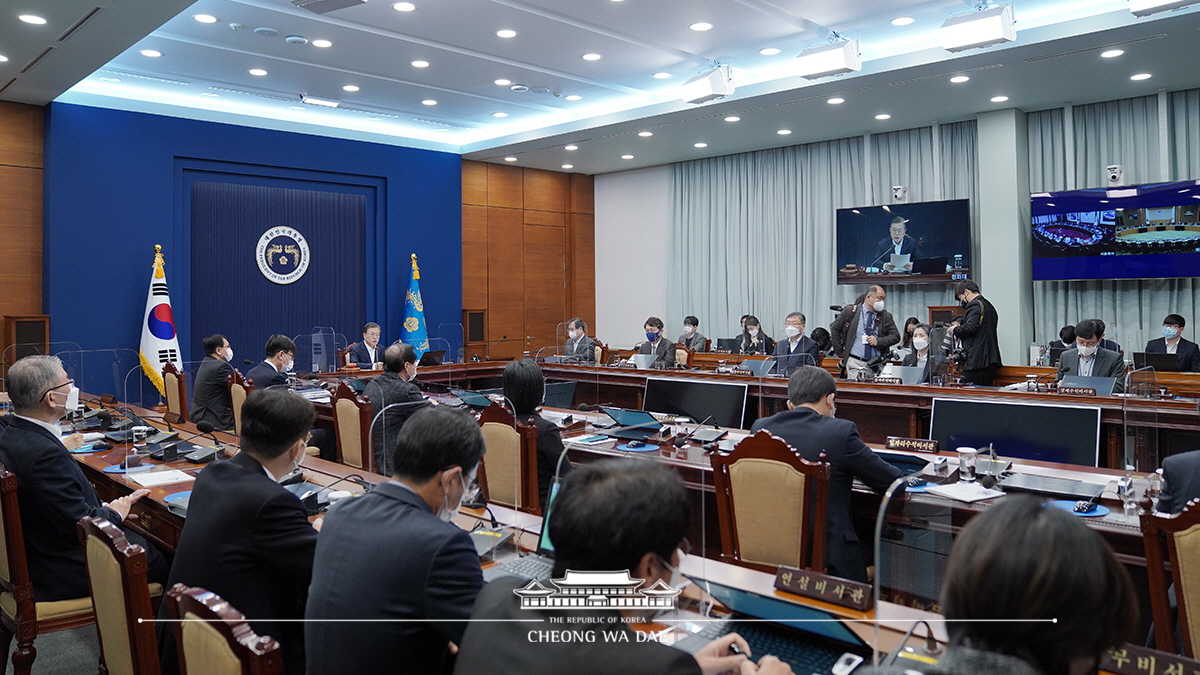이 웹사이트는 제19대 대통령 임기 종료에 따라 대통령기록관이 「대통령기록물 관리에 관한 법률」에 의해 이관받아 서비스하는 대통령기록물입니다. 자료의 열람만 가능하며 수정 · 추가 · 삭제는 불가능합니다.
다만, 「개인정보보호법」에 의하여 개인의 정보를 보호받기 원하시는 분은 관련 내용(요청자, 요청내용, 연락처, 글위치)을 대통령 웹기록물 담당자(044-211-2253)에게 요청해 주시면 신속히 검토하여 조치해 드리겠습니다. 감사합니다.
SPEECHES & REMARKS
BRIEFINGS

The entire world is going through hardship as the pandemic has been dragging on for more than a year now. Amid a disaster unseen for a century, every government is working desperately to escape the crisis. The Korean Government is also overcoming the national crisis with extraordinary determination and commitment.
However, the crisis has yet to end, and there remain many mountains to climb and valleys to cross. Government ministries and agencies as well as civil servants should renew their resolve. Even though they have been working hard under difficult conditions, they need to break through the crisis with a more pioneering, innovative and inclusive attitude.
First of all, I urge everyone to boldly take on challenges. Victories never come to those who are afraid. Only when we tackle crises head on will we be able to surmount challenges and create greater opportunities.
Squarely standing up to Japan’s export restrictions, we turned the incident into an opportunity to attain technological self-sufficiency in the materials, parts and equipment industries. We actually made that misfortune a blessing in disguise. Likewise, even amid the COVID-19 crisis, we have come to rediscover a “Republic of Korea resilient to crisis,” gaining praise worldwide for being a model country for overcoming the crisis.
In addition to setting an example in epidemic prevention and control, we have seen our country’s status rise further as a manufacturing and export powerhouse on the economic front as well. We are drawing attention as the country that will achieve the fastest and strongest economic recovery. This is all attributable to implementing expansionary fiscal policies confidently in defiance of a crisis. The achievements also arise from adopting the Korean New Deal as a new national development strategy and strongly pushing it with the spirit to take on a challenge.
Next, I urge you to have an innovative attitude. Recovery, our paramount goal for this year, does not simply mean a return to the past. It is about preparing to leap into the future. In the wake of the COVID-19 outbreak, the world is already changing at an enormous pace. A contact-free economy, digital innovations and the transition to a low-carbon economy have themselves become matters of survival and indispensable for recovery.
Without innovation, it is impossible to create new opportunities. Without manufacturing innovation, we cannot envision becoming a manufacturing powerhouse. Without technological innovation, we cannot leap toward the future. We can no longer afford to delay regulatory innovation either. The regulatory sandbox system that our Government introduced two years ago is now producing tangible economic benefits by facilitating progress in such new industries as hydrogen-fueled cars and biohealth. Innovation must be accelerated further. I believe that a time of crisis will become a time of opportunity if in the course of overcoming the crisis great innovations emerge.
Finally, I ask you to consistently maintain an inclusive attitude. The Government pledged to make this year one for recovery and resurgence. However, the recovery and resurgence cannot be achieved without inclusiveness. Based on the clear understanding that inclusiveness is the foundation of our recovery and resurgence, I urge each ministry and agency to focus the capabilities of your policies on mitigating inequality and disparity. The key to inclusive recovery is surmounting the employment crisis, and alleviating the hardships of microbusiness owners and the self-employed is also a task that cannot be overlooked. Moreover, the policy of supporting the incomes of the vulnerable should be further strengthened to bring about improvements in income inequality.
In greatly transforming our economy and society, including through the Korean New Deal and carbon neutrality, we must also achieve an inclusive transition that does not marginalize any income group, region or industry. I ask every ministry and agency to clarify the aim of reinforcing inclusiveness in their policies and take responsibility for people’s lives. In addition, a system has to be established to regularly check what achievements have been made through enhanced inclusiveness.



